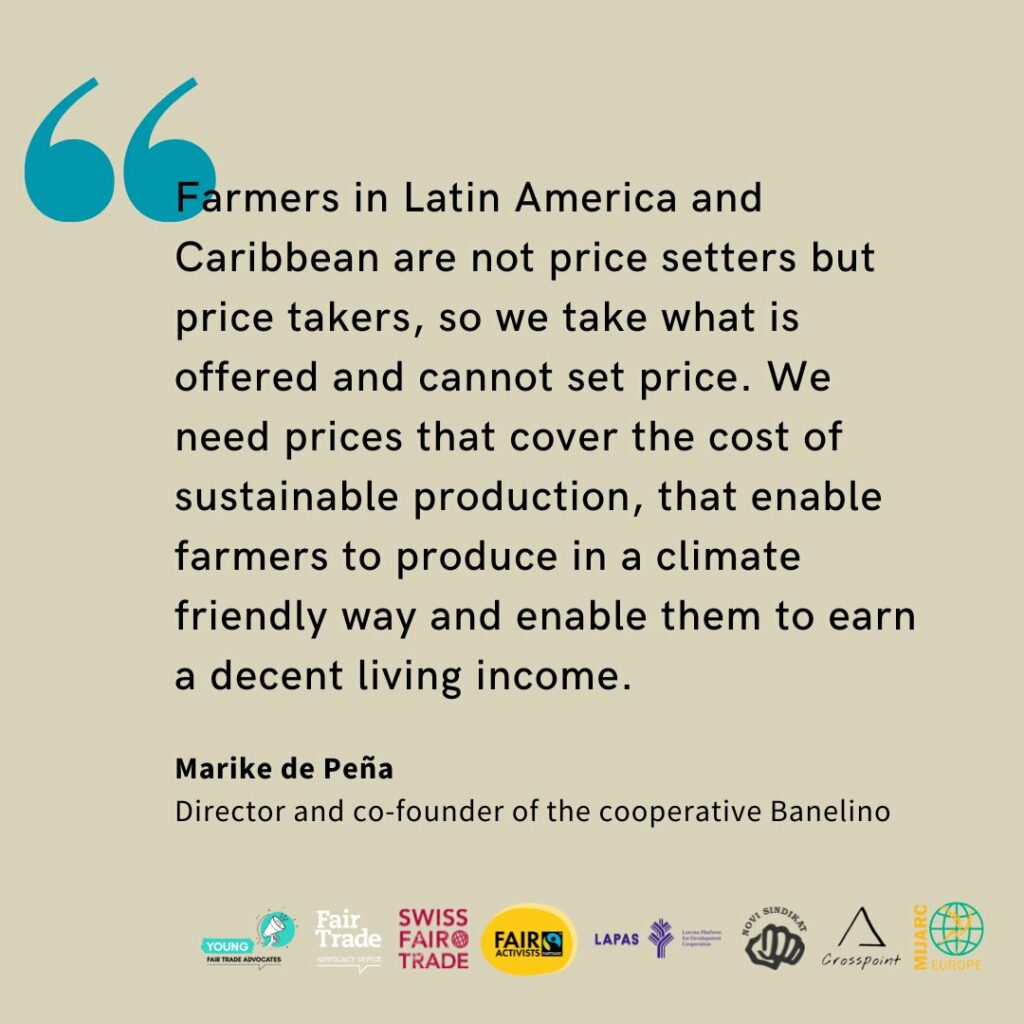The Young Fair-Trade Advocates, a group of young activists linked to the Fair-Trade Movement, have organized a four-encounters online event called “International Youth Dialogues” aimed at discussing the impact of European Union Trade Agreements in the Global South, namely in the field of labour rights, prices, gender issues, and environment.
What are EU Trade Agreements? Contractual arrangements that the European Union signs with Third countries with the aim to reduce barriers to exports, import duties, etc.
The second Dialogue took place on the 21st of February. It was mainly focused on the aspects concerning how these agreements affect prices and three experts were asked to give their perspective on the phenomenon.
According to Marike de Peña, Director of the Banelino Cooperative, a successful Fair Trade banana smallholder organization in the Dominican Republic: «producers [in the Global South] suffer a lot from unfair trading practices, and they are often forced to sell below the cost of a sustainable production». This happens mostly because farmers in the Global South are structurally forced to be price takers, which means they have to accept the prices settled by the market for their goods, without being able to influence it.
If goods are not paid enough, then there is no money to remunerate fairly, to guarantee human rights and to prevent phenomena such as deforestation, land degradation and, more broadly, the protection of the environment.
The same situation can be seen in the garment sector, as explained by Muhammad Azizul Islam, professor in Sustainability Accounting & Transparency at the University of Aberdeen Business School: «In Bangladesh not a single supplier reported to have taken their buyer to court for cancelation of orders or refusal to pay». Local companies are not in the condition to report abuses from big brands, so they are not able to pay a minimum legal wage to workers, causing widespread forced labour.

It is thus necessary to work more on “fair prices”and we need to be more public and clearer on what they need to cover. Expectations (from the consumers) are in fact not the current reality as experienced by workers in the Global South. For this reason, if we want a fair way of trading, healthy food for people, and good for the climate, we need to learn more about what this fair cost entails.
How can farmers and workers claim their rights? According to Brendah Akankunda, lawyer and program coordinator in trade, investment and development at SEATINI, Uganda: «This is about justice, and it is necessary to follow pathways that enable farmers and workers to speak up». She continues, that countries in the Global South must have a say in negotiation tables and there is a need to review investment policies which do not even mention the protection of workers’ rights, of communities and environment.
Also, the EU can have an impact: policy makers at different levels have to understand and to tackle the root causes of these issues, also by shifting the perspective from a solely top-down approach to one based on a real dialogue among politicians, suppliers, buyers, and producers that suffer prices. That is because people that live the consequences of issues have the better solutions.
The last two events will take place on the following dates:
- “The Unheard Voices” on the impact of EU Trade Agreements Gender – March 7th from 3pm to 4.30pm (CET), register here.
Speakers: Carolina Pavese (Professor of International Relations at ESPM, Brazil), Deborah Osei-Mensah (Asunafo Cocoa and Fair-Trade Ambassador, Ghana)
- “Not a Gold Mine” on the impact of EU Trade Agreements on the Environment and Mining – March 21st from 3pm to 4.30pm (CET), register here.
Speakers: Carolina de Moura (Brazil), Luis Jimenez Caceres (Chile), Mike Anane (Ghana)

